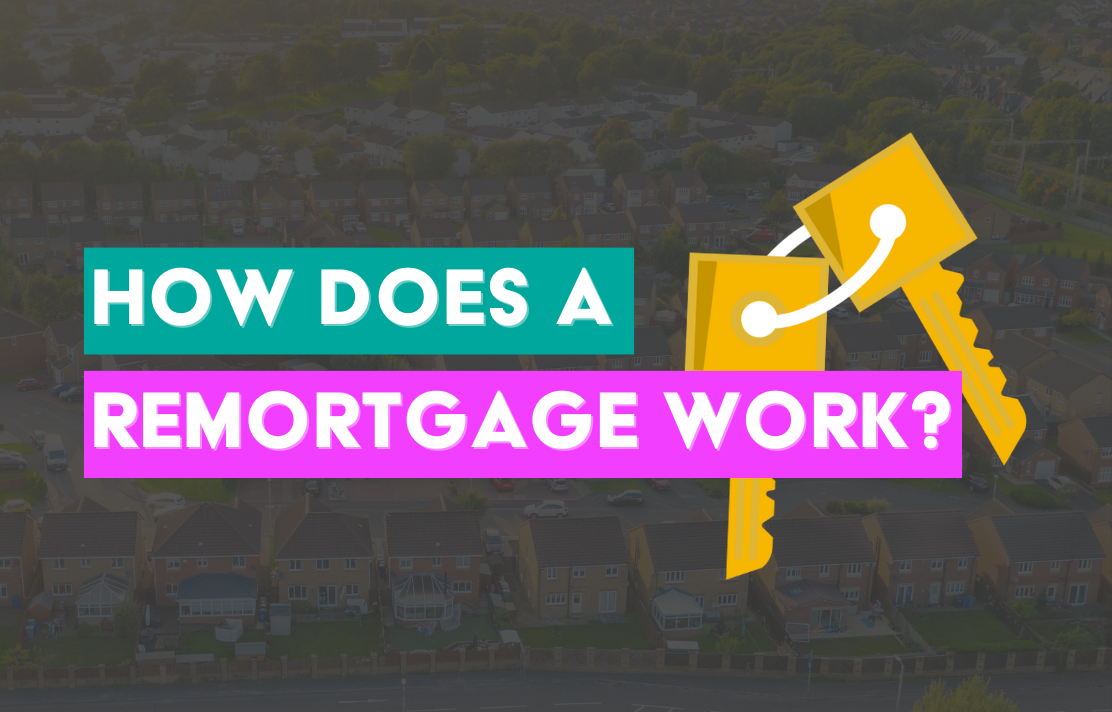Remortgage your home with ease! Learn why, when, and how to remortgage with UKMC’s expert guidance to save money, access equity, and secure better rates.
Is your existing mortgage deal coming to an end soon? If so, it’s time to think about remortgaging!
While the remortgaging process may seem daunting, the knowledgeable team at UKMC is here to make it straightforward.
Regardless of whether this is your first time remortgaging your home or you’ve remortgaged many times before, it pays off to have a clear understanding of the process.
Below, we explain why people remortgage, when is the right time to think about remortgaging, and how a remortgage works in just a few easy-to-follow steps.
What does it mean to remortgage?
Remortgaging simply refers to opting for a new type of mortgage deal once your existing arrangement comes to an end, while remaining in the same property.
Typically, mortgage terms last for between two and five years, but some lenders will offer terms of just six months. When you’re nearing the end of your term, you may want to think about remortgaging.
In some cases, you may decide to remortgage with the same lender, but in others you may choose to switch lenders if you can find a better deal elsewhere.
How does a remortgage work?
When you remortgage, the proceeds from the new mortgage deal are used to pay off the previous mortgage arrangement using the same property as your security.
Why consider a remortgage?
Unsure whether it’s worth remortgaging?
If you’re new to being a homeowner and are wondering ‘why do people remortgage’, we can help.
There are many reasons homeowners might choose to remortgage.
From saving money to releasing money and even paying for home improvements, we explore some of the most common reasons for remortgaging in more detail below.
Save yourself money
One of the biggest reasons that people decide to remortgage is to simply save themselves money.
A lot can change in the two or five years since you took out your first mortgage, so there may be better deals elsewhere that weren’t available previously.
When you choose to shop around for deals from other lenders, either on your own or with expert support from a mortgage advisor like UKMC, you can feel confident that you’re getting the most out of your money.
You want a better rate
Obtaining a better interest rate is one of the most common reasons for remortgaging.
Linked to saving yourself money, remortgaging will allow you to reduce the size of your loan and potentially benefit from a better interest rate than your current deal.
Instead of paying the higher interest rate, the money you save by switching (as long as you don’t switch before the end of your mortgage term as this can incur additional costs) can go towards family holidays, home improvements, or even a new car!
Your circumstances have changed
Alongside changes to the market, your personal and financial circumstances may also have altered, either according to plan or unexpectedly.
As a result, your current mortgage may no longer suit your needs.
For example, if you’ve obtained a pay rise, significantly improved your credit score, or decided to start a family, you may want to secure a deal with a lower interest rate or shorter term.
Alternatively, you may be earning less now or have more outgoings and therefore keen to explore deals from other lenders with longer terms, but lower repayments.
By updating your personal details to take into account any changes, you can secure a deal that works for your specific circumstances as they are now (or will be in the future), not as they were two or even five years ago.
You want more flexibility
Remortgaging also gives you a chance to change the terms of your mortgage agreement (within the confines of the terms lenders are willing to offer you), if desired.
Regardless of whether you want to decrease your mortgage term or add in the option of a mortgage payment holiday (a temporary agreement made between you and your lender where you can stop or reduce your monthly mortgage repayments), this is your time to explore other deals that might be more suitable for you.
Your mortgage term is about to end
If you decide not to remortgage, then your existing lender will typically move you on to their ‘standard variable rate’ (SVR) mortgage.
This means your mortgage payments will vary each month according to the ever-changing interest rate set by the mortgage lender.
When taking out a mortgage, homeowners will often opt for a fixed rate, discount, or tracker mortgage which has a set interest rate for the length of the mortgage term.
As a result, these fixed rate deals are generally much more affordable than SVR deals that tend to have much higher interest rates.
By doing nothing when your mortgage term comes to an end, you could find yourself automatically switched to your lender’s SVR deal, leading to a significant increase in your monthly mortgage repayments.
Your home has increased in value
Added value to your home since obtaining your mortgage? If so, it’s likely that your loan to value (LTV) ratio (a ratio that compares the amount of money being borrowed against the market value of an asset) will have improved!
As a result, lenders are more likely to offer you the opportunity to remortgage at a lower interest rate either through a product transfer deal or by switching lenders completely.
You want to access equity
One way to get more out of your home when remortgaging is to release equity at the same time.
This involves borrowing money based on the value of your home, so the higher the value of your home, the more equity you’ll be able to access.
Ideal if you want to make some significant home improvements or cover the costs of your child going to university, releasing equity when you remortgage allows you to take out either a cash lump sum or receive regular monthly payments.
Each lender will have a maximum loan to value (LTV) that they are willing to lend you based on a variety of factors, but this figure is often between 20% and 60% of the value of your home.
How do you know it’s time to remortgage?
So, when should you remortgage? The best time to think about remortgaging is when you’re coming to the end of your existing mortgage arrangement – typically six months before it ends.
This will give you plenty of time to determine what you want, do your research, and even contact an experienced mortgage advisor, like UKMC, to discuss your options more thoroughly.
This is because once you find your ideal deal, the entire process of remortgaging can take between four and eight weeks from your initial application through to completion.
It’s also worth mentioning that while remortgaging at the end of your mortgage term is ideal, you can actually remortgage at any time.
However, you must be aware of the Early Repayment Charges (ERCs), exit fees, and other costs that may be involved with leaving your existing deal early and switching to another lender.
Once all these costs related to exiting your current mortgage arrangement have been added up, you may find that switching to a new deal with another lender may not leave you as well off as you initially thought.
Step-by-step process for a remortgage
To help you learn more about how a remortgage works, our friendly team of mortgage advisors explains the entire process in just a few straightforward steps.
Contact a mortgage broker
Your lender will typically reach out to you when your existing arrangement is coming to an end to discuss your options. In many cases, they’ll offer you a more attractive deal than your current one to encourage you to remain with them.
If they don’t contact you, or you want to discuss your options early, it’s worth contacting them yourself.
Once you’ve discussed the various deals your current lender is willing to offer you, it’s important not to sign on the dotted line before you’ve done your market research.
Part of this essential task should include contacting an experienced mortgage broker, like UKMC.
With access to exclusive deals, they can review your options and help you identify more suitable lenders and mortgage arrangements.
Not to mention, if you’re unsure about any part of the remortgaging process, an expert mortgage advisor can help you to understand what’s happening and why, as well as explain complex terms.
They can also be essential for helping you decide between one deal and another by explaining how each one would work for your specific circumstances.
Choose a suitable deal with a mortgage broker
Now you’ve done your research and have even reached out to the professionals, it’s time to make a decision with a helping hand from an expert mortgage broker.
However, when it comes to picking the right deal for you, it’s important not to get carried away with a low interest rate.
Instead of focusing on just this one element, you mortgage broker can help you to seriously consider the potential impact of product fees, early repayment charges (ERCs), exit fees, and valuation fees.
Similarly, switching lenders when remortgaging instead of sticking with your existing lender using a product transfer deal can also be a more costly and time-consuming process, so it’s important to weigh up the pros and cons of each with support from a mortgage broker.
Reaching out to a mortgage broker to complete an Agreement in Principle (AIP) can also help you to determine which lender is willing to offer you a deal.
Don’t leave it until the last minute
After choosing your desired lender and deal with help from a mortgage broker, it’s vital that you don’t wait until the last minute!
From the initial application to completion, the remortgaging process can take anywhere between four weeks to a couple of months even with expert support from a mortgage broker.
You should start doing your research and contacting a mortgage broker, like UKMC, six months before your current mortgage term is due to end.
Apply for your new mortgage
Ready to remortgage?
Once you’ve found your ideal mortgage deal and have an AIP, you should contact your mortgage broker to apply for your remortgage.
You’ll need to supply them with the same personal and financial information and documentation that was required for your initial application.
After your lender has carried out a full credit check and arranged for your property to be valued, a solicitor or conveyancer will then be required to handle the official transfer of your mortgage.
Remortgage your home with UKMC
Keen to learn more about our mortgage services or how a remortgage works?
If you’d like to save time, money, and stress when remortgaging, please don’t hesitate to contact the team of experienced remortgage advisors at UKMC today.
Our down-to-earth team won’t baffle you with confusing jargon, overwhelm you with technical complexities, or blindside you with hidden costs.
Instead, we offer a clear breakdown of costs and guide you through each stage of the remortgage process, so you always know exactly what’s going on, as well as why and when it’s happening.
This transparent and tailored approach means you can concentrate on what matters most – choosing the most suitable mortgage deal and lender to meet your specific requirements.
If your current mortgage deal is due to end within the next six months, why not book your appointment with our team and explore some of the fantastic new deals currently on the market?
To reach out, please feel free to either give us a call on 01925 573328, request a call back using our online contact form, or email us at hello@ukmc.co.uk.
We also welcome in-person visits to our office if you prefer a face-to-face appointment! However you decide to get in touch with our helpful team, we hope to hear from you soon.
Disclaimer
UK Mortgage Centre Limited is an Appointed Representative of Refresh Mortgage Network Limited. Refresh Mortgage Network Limited is authorised and regulated by the Financial Conduct Authority. We are entered on the Financial Services Register under firm number 1019794.
As a mortgage is secured against your home, it could be repossessed if you do not keep up the mortgage repayments. The Financial Conduct Authority does not regulate some forms of buy-to-let mortgages.
The Financial Conduct Authority does not regulate will writing and taxation and trust advice.
You may be charged a fee for your advice. A typical fee is £495, which would be payable when you receive your mortgage offer. Your dedicated advisor will discuss this further on your free initial phone call.
Registered company number: 15825320









